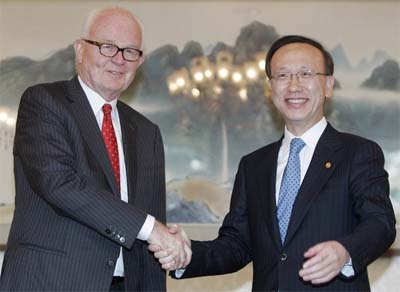On the other hand, Obama also wants to secure acceptance and listen to allies as a fundamental part of his foreign policy. These two principles are difficult to reconcile and apply to North Korea.
Speaking with the enemy has been difficult to pursue with North Korea with the continuing escalations during the spring and summer with missile and nuclear testing. So far the talk has not been direct and has gone through the media. Hillary Clinton has been comparing North Korea to an unruly teenager and North Korea on their side has called her ‘a funny lady’.
North Korea has declared the Six Party Talks useless and is not intending to return to them. The US’ allies, notably Japan and South Korea are reluctant to see the US engage bilaterally with North Korea. It could both reward bad behavior and sideline the allies. They felt left out, especially Japan, during the last part of Bush’s presidency and chief negotiator Hill’s quick negotiation moves. That is also why South Korea recently suggested continuing the Six Party talks without North Korea to secure a continued common line among the other partners.
The US seems now to have found a temporary middle position satisfying both principles. The recent news regarding North Korea is the US’ move to engage in direct talks with North Korea. It will be talks that are bilateral but called – with diplomatic finesse – a part of the framework of the multilateral Six Party Talks and as a means to convince North Korea to return to these negotiations. In this manner, the US aims to adhere to both to the foreign policy line of speaking to the enemy and of listening to allies.
On that background, I had the pleasure of interviewing the US special Envoy, Stephen Bosworth recently after his visit to the partners in the Six Party talks and ask him some questions that illuminate the dilemmas in dealing with North Korea.
Q. Obama stated that the US should talk to enemies and listen to allies as foreign policy tenets. How do you reconcile those priorities when it comes to North Korea?
We are doing both. We have just been conducting intensive consultations with our partners. I’m referring to the other four members of the Six Party Talks; namely China, South Korea, Japan and Russia. We are solidly in agreement and share the same goal of denuclearising North Korea.
With regards to North Korea, we have consistently stated that we would be willing to engage in dialogue with North Korea. The goal of our bilateral talks is to persuade North Korea to return to the Six Party talks.
Q. Is the recent move such a middle ground between the two priorities? Direct talks but only to revitalize the Six Party talks – you speak with the enemy and still please the allies?
Well, we describe them as bilateral talks within the Six Party talks because the aim is both denuclearising and getting North Korea back to the Six Party talks. In the end what is needed is a multilateral solution. There is not one country that can provide a solution alone to all that the country wants.
Q. Can sanctions push North Korea back to the negotiation table?
Not on their own. Sanctions have to be combined with possibilities for North Korea in the form of incentives.
Q. Can China push North Korea back to the negotiation table?
The Chinese are an important player. We are working closely in contact with them. They have their direct bilateral contact with North Korea which is important. Yet answering your question, I think that China is the best source to evaluate how much influence they actually have on North Korea.
Q. Can you get North Korea back to the negotiation table?
[laughter] Definitely not by myself. The chances really are better in a multilateral setting.
Q. If/when you go to North Korea what are the main messages you are going to convey?
I will say that we are willing to restart the negotiation process. We should start from the 2005-statement in the Six Party talks, which clearly stated that denuclearisation was the shared ambition – also by North Korea. And secondly, I will say that the Six Party talks format is the means to achieve that goal and that North Korea should return to them.
Q. What if bilateral contacts from your side do not lead back to a resumption of the Six Party Talks – will you continue the bilateral track then which could annoy the allies?
That is too soon to comment on. We will have to make a decision based on the results of our diplomatic effort.
Q. Returning to talking with the enemy. Do you see it as likely that Obama during his Presidency will meet in person with Kim Jong-il?
I have no idea. If such a meeting were to happen it would be an indication of significant progress with regards to North Korea and denuclearisation.
Q. Is nuclear North Korea a fact we have to live with – however discomforting?
One of the purposes of engagement is to start a process of dialogue to change North Korea’s perception of self-interest. North Korea is saying that they will not give up their nuclear weapons. That is the situation right now. Our task is to change that position through engagement and persuasion. That is diplomacy.
Q. Are there other long-term solutions than negotiations?
I don’t think so. There is no military solution. Containment does not give long-term results. Negotiations are the way forward.

